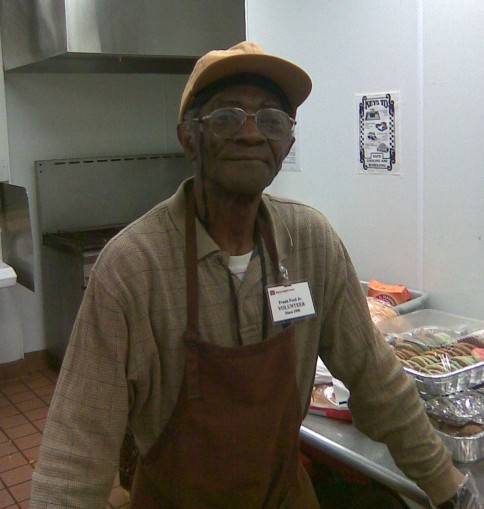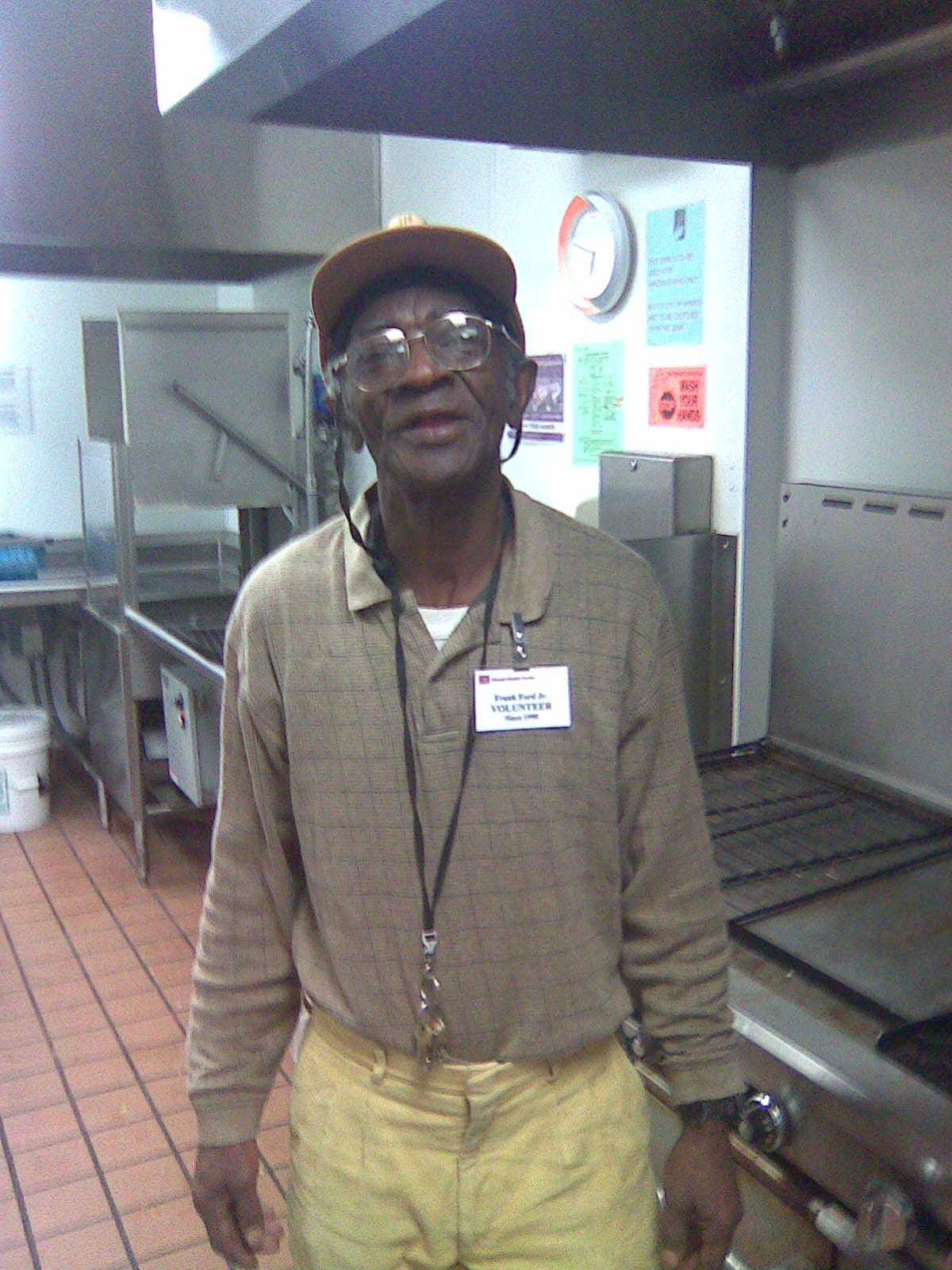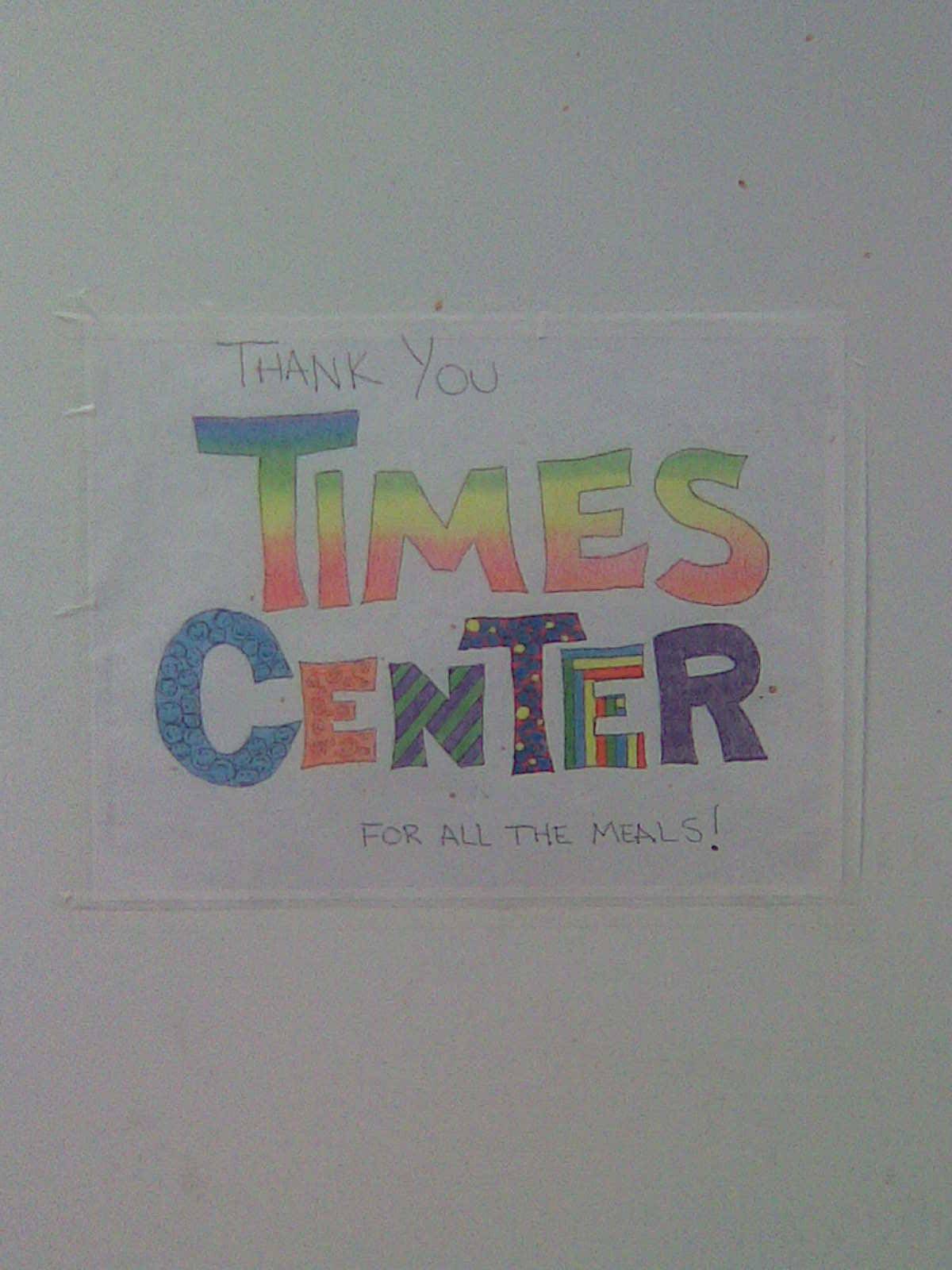
A few Sunday evenings back, dinner was ending at TIMES Center; it was that time before chores start when shelter residents and other guests are chatting and finishing their food. A resident stood patiently at the counter waiting for 6:20, the time when cook Frank Ford Jr. would start serving seconds.
“The beef stew was great,” said the resident, a large man in his twenties who inhaled his first serving of stew, rice, beans and garlic bread. “You could tell it was homemade because of the carrots. The way they were cut.” Ford agreed. The resident looked at Ford a moment before he continued, “You’re not getting paid, right? You’re doing this out of the goodness of your heart?”
It’s true. Ford is at TIMES Center volunteering almost every day. All year round. Out of the goodness of his heart. Frank pointed to the nametag on his shirt, which lists the year he started volunteering. “I’ve been doing this since 1990,” he said.
The resident paused; he wasn’t born much before 1990. “Wow. That’s like twenty years.”
Ford was born in 1946 in Gary, Indiana, and was raised there. As a young man, he spent about 20 years working in the steel mills of the city. But in 1982, he was laid off. A geographic change seemed like a good idea, and Champaign-Urbana seemed like a good destination. Ford had family in the area and liked what he saw when he came down to visit them. He said, “I would come here to visit on my vacations. I would say, ‘I don’t see no slums.'”
He found work in C-U quickly enough, but then, according to him, this wasn’t as hard in those days: “Back then, it was easy to get a job here. You could get a job, then go across the street and get another job.” Since arriving in C-U, Ford has worked at a variety of jobs, including stints at Developmental Services Center, Plastipak, and a number of different restaurants.
It was at Urbana Country Club, when he began to cook professionally. When he was employed there as a dishwasher, he stepped in at a pinch to make some bite-sized sticky buns, which turned out to be a big success. He explained, “Later on we had a meeting with the guests. When the man introduced me, he said, ‘This is the cook that made the sticky buns.’ They cheered me like I just won the Super Bowl.” This led to working as a cook at other restaurants around town. Trying different things, he learned the art: “It was really rewarding at all different restaurants learning all different stuff. And if you can sauté, you can cook anything.”
 As the ’80s turned into the ’90s, Ford was drinking heavily and unable to pay his bills, although he managed to hold down his various jobs. He went through periods of homelessness and lived as a resident at the shelter at McKinley Church in Champaign — which later became TIMES Center — on more than one occasion. As a resident at the shelter, Ford began volunteering in the kitchen.
As the ’80s turned into the ’90s, Ford was drinking heavily and unable to pay his bills, although he managed to hold down his various jobs. He went through periods of homelessness and lived as a resident at the shelter at McKinley Church in Champaign — which later became TIMES Center — on more than one occasion. As a resident at the shelter, Ford began volunteering in the kitchen.
He continued volunteering at the church after he was living on his own and later at TIMES Center when it opened. Ford remains grateful for the services offered him during his shelter stays: “I always looked at it that I was blessed. I would see people struggling. I thought I was struggling, but I wasn’t. Now, I had a place to bathe, plenty to eat. Some guys don’t feel that way, but quite a few of them do.”
In 1995, he ended up in the hospital from drinking, and the experience sobered him up. He said, “The doctor told me: you almost met your maker. I went cold turkey and haven’t had a drink since 1995. God woke me up.”
At the age of 62, Ford left his job at Plastipak. He opted to start receiving a reduced social security check. He said, “I ain’t waiting until I’m 65; I might not be living.” This left him free to spend a lot of time at TIMES Center volunteering in the kitchen. In part, this was simply because of a desire to stay busy. “I never was one to sit around,” he said.
 Ford said that he does about four to five hours of “actual work” in the kitchen a day at TIMES Center, seven days a week. He estimates that he takes off about three weeks a year. TIMES Center serves meals three times a day, 365 days a year. They served an estimated 64,000 meals last year alone to both residents and outside community members, using food that was donated, purchased from a food bank, and grown in the garden on site which Ford maintains along with the help of residents and community volunteers.
Ford said that he does about four to five hours of “actual work” in the kitchen a day at TIMES Center, seven days a week. He estimates that he takes off about three weeks a year. TIMES Center serves meals three times a day, 365 days a year. They served an estimated 64,000 meals last year alone to both residents and outside community members, using food that was donated, purchased from a food bank, and grown in the garden on site which Ford maintains along with the help of residents and community volunteers.
Ford claims that it’s actually easier to cook for large numbers of people: “There’s nothing hard about it. I remember what my mom said: ‘It’s easier to feed a whole lot of people than it is to feed one or two.’ And that is the truth.”
It was Ford’s mother who taught him to cook in the first place. He laughed as he recalled the first dish that he ever prepared as a child: “I had to cook fried chicken; I get flour everywhere. My mom said, ‘You got to clean that up.'”
Ford explained that part of his job at TIMES Center is dealing and interacting with the residents and community members eating the food the kitchen prepares. He said, “It’s a challenge. You get all different types of people coming up through the line. And sometimes you get problems with them when they come up there. You know exactly what they’re going to do before they do it. I don’t get angry.”
Through Mental Health Center, the parent organization of TIMES Center, Ford has taken a number of classes, including ones on conflict mediation, which come in handy in what can sometimes be a tense work environment: “You got to defuse the situation,” he explained of conflict in general. “You can’t get mad yourself.”
At one point over the years, he counseled juvenile offenders in trouble with the law. He recalled one youth who challenged him. Frank told the young man, “I been homeless. I know what I’m talking about.” However, in the encounter, Ford stressed he didn’t know everything: “My word is not law; God is law.” In the end, he got his message across: “And he done went straight. He sends me Christmas cards.”
When not at TIMES Center, Ford enjoys “reading about other countries” and watching the Discovery Channel. He has two grown children and two grandchildren. He shares with them the scrapbook he keeps of the articles that have been written about him in publications such as the News-Gazette, the Daily Illini, and — soon enough — Smile Politely.
Ford said of his volunteerism: “I couldn’t just sit in my apartment.” A neighbor in Gary told Ford when he was young, “When you sit, you’re just sitting to die,” and he takes her words to heart now that he’s “retired.”








